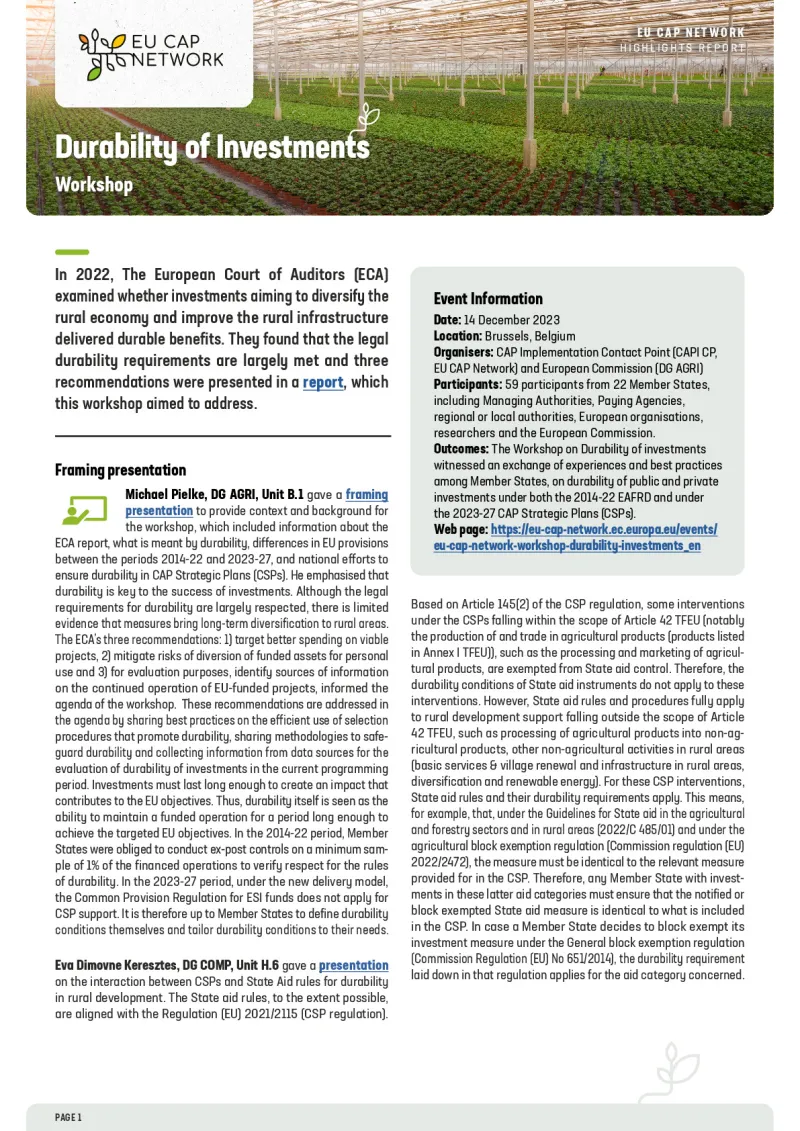Valuable knowhow appreciated about the durability of investments
- CAP Implementation
- Food Supply Chain
- Agricultural Productivity
- AKIS
- CAP Strategic Plans
- Climate and Climate Change
- Communication
- Data Management
- Digitalisation
- Education
- Environment
- Forestry
- Fostering Knowledge & Innovation
- Generational Renewal
- Green Deal Targets
- Jobs, Growth and Equality in Rural Areas
- LEADER
- Long-term Vision for Rural Areas
- Networking
- Research & Innovation
- Rural Development
- Smart Villages
- Social Inclusion
- Sustainability
- Tourism
Interesting enabling factors supporting the durability of benefits from CAP Strategic Plan funding are featured in a Highlights Report from the EU CAP Network expert workshop analysing investment durability.

Opportunities to achieve longer lasting durable results from EU funding will remain a highly pertinent topic for all CAP Strategic Plan (CSP) stakeholders during the current CAP period. A highlights report from the EU CAP Network’s expert gathering on the durability of investments is now available to help clarify enabling factors for safeguarding better durability of CSP funding.
Tips and expert opinions presented in the highlights report were harvested from an EU CAP Network workshop on the durability of investments that brought together users and managers of CAP funds from around Europe. Participant feedback highlighted their appreciation of the value of this workshop, especially findings and exchanges from different Member States about possibilities for providing effective durability.
Selection criteria require applicants to provide indicative evidence in advance that shows their projects will have long-lasting benefits - as long as the legal requirement, at least. Legal certainty about minimum standards and definitions of durability in different funding contexts are also necessary.
Networking among Member States on these matters is noted in the highlights report as beneficial. “Different support rates may lead to different results” was a key conclusion concerning durability achievements, as was the scope for substituting grants with loans to boost commitments by CAP beneficiaries to project durability. Other success factors from Member States demonstrated the potential for achieving better quality funding proposals by involving appropriate specialist advice during the planning stages of project proposals. Affordability and availability of such capacity building expert support was also considered key.
Further interesting and informative experiences shared by the report cover whether grants for investments might sometimes risk being too generous and decrease potential durability. Swedish evidence from the workshop found that a decreased support rate incentivised farmers to do better.
Impressive prospects
Durable results from CAP financing are attainable by Member States and in Austria, for example, an impressive 98% of agri-tourism projects were reported at the workshop as still offering accommodation more than five years after their funding. Cyprus achieves a high proportion of successfully durable projects by ensuring that proposals address real needs. The Paying Agency of Romania has achieved durability controls on 3% of the total value paid annually, including at least two projects per region. This exceeded the 2014-2022 CAP period’s legal requirement obliging Member States to conduct ex post controls on a minimum sample of 1% of the financed operations to verify respect for the rules of durability.
Workshop discussions compared perspectives on the balance needed between flexible systems facilitating project results and robust controls protecting public resources. Consistency remains important for the efficiency of all public expenditure programmes and flexibility was acknowledged by participants as helpful because ‘one size may not always fit all’.
The report advises that “it is important to understand the tipping point between flexibility and when a project is not viable. Before allowing flexibilities, Managing Authorities should ask: do we still reach the objectives with the intervention?”. Participants at the workshop also agreed that it is important for financial control frameworks to be transparent and differentiate between mistakes as opposed to fraudulent behaviour. Nurturing a culture of systemic transparency between beneficiaries and funding bodies about project problems can build significant trust. This helps decrease the need for funding to be withdrawn or reclaimed.
More networking and exchanging on matters supporting the durability of the EU funding can help improve implementation of CSP interventions in Member States.
